Hit Me With Your Best Shot: 'The Conversation'
 Thursday, March 3, 2022 at 9:35PM
Thursday, March 3, 2022 at 9:35PM by Nathaniel R
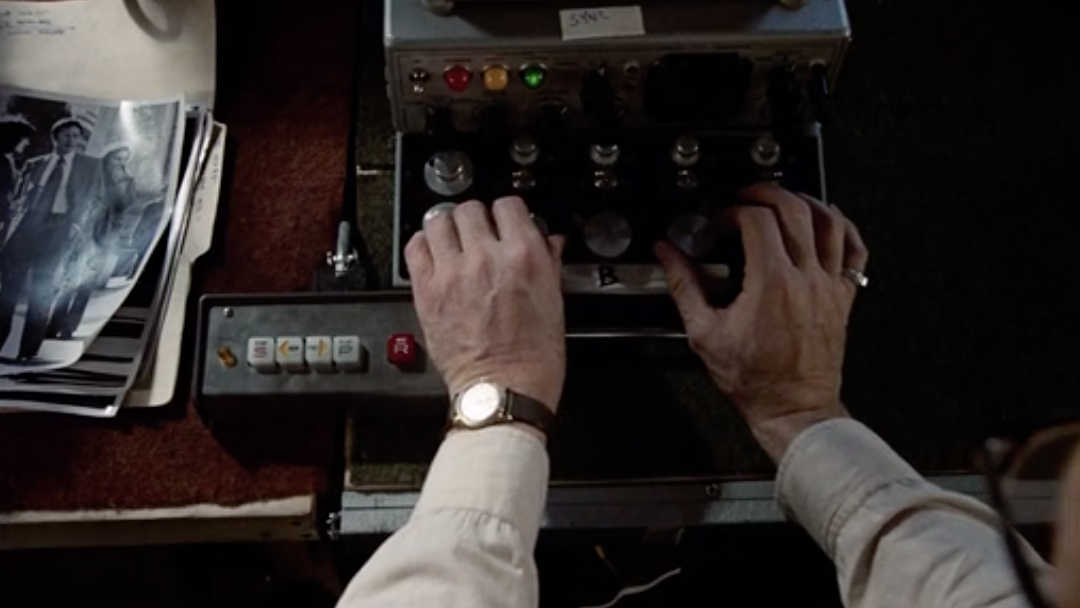 a wonderful 'establishing shot' not of a building but of a man (Gene Hackman), his targets (in photographs), and the tools of his trade.
a wonderful 'establishing shot' not of a building but of a man (Gene Hackman), his targets (in photographs), and the tools of his trade.
Francis Ford Coppola's The Conversation (1974) is nothing if not elusive. So many of the images in this paranoid mystery are obstructed. Coppola and the cinematographer Bill Butler are continually adjusting focus and searching for the subject and his targets. The protagonist, an 'unreliable narrator' type albeit without the narration, is Harry Caul (Gene Hackman, brilliant) and he's often hiding in the corner of frames, or with his back turned to us. The film begins with a full circle, as Harry is spying on a man and a woman as they walk around a city park. For what reason we do not yet know and might never know. Though we see his targets frequently, there are constant visual interruptions from trees and people and their own movements. We understand this to be Harry's view, figuratively if not literally, since people can't move like a crane shot or zoom in for a closeup...
The sound is even more distorted. Harry and his team are recording the man and woman's conversations but due to ambient noise, street traffic, and the positioning of their imperfect equipment the voices are often muffled. Later Caul will work obsessively to adjust the sound and decipher the meaning of the banal but cryptic conversation.
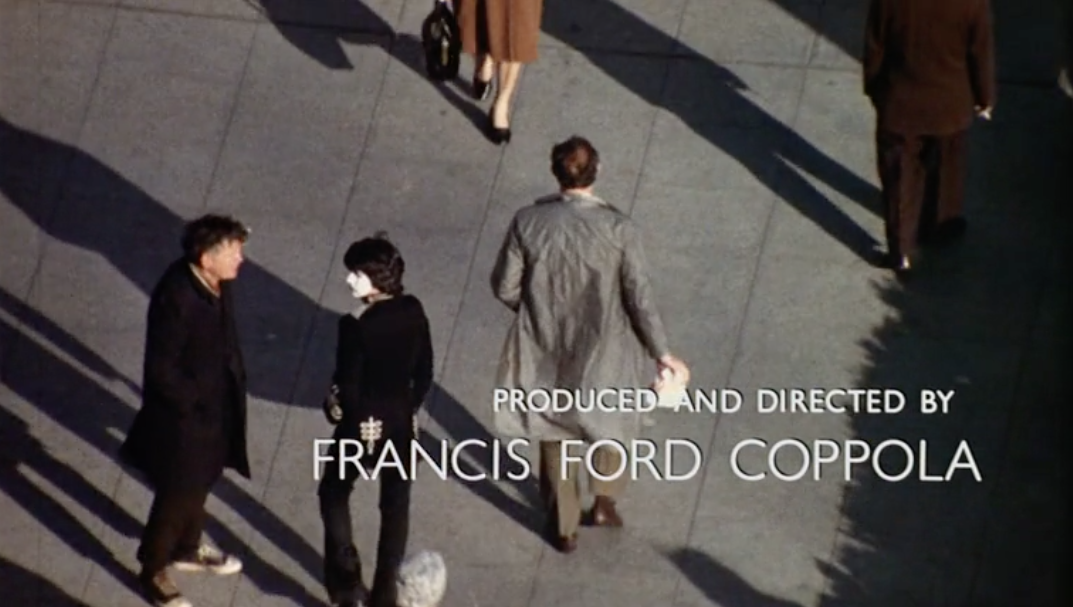 Though the Conversation is not a funny movie by any stretch of the imagination having a mime taunt the three main characters in a movie about sound, during the opening credits is kind of a great antagonizing joke.
Though the Conversation is not a funny movie by any stretch of the imagination having a mime taunt the three main characters in a movie about sound, during the opening credits is kind of a great antagonizing joke.
One of the greatest books on filmmaking is "The Conversations Walter Murch and the Art of Film Editing" by Michael Ondaatje. The book gives you rare insight into film structure, and particularly the collaborative arts of sound and film editing. There's a large section in the book about this very film in which the editor Walter Murch likens the protagonist Harry to Francis Coppola himself (while underlining that their personalities are much different!) in their painstaking devotion to their craft. He also discusses how hard it was to get the picture's balance right:
Francis was interested in following an anonymous person and really investigating the fabric of his life. It was a courageous act on his part never to flesh out the story...
We know there are two suspects but what and who they are, and what their real jobs are, and what their relationship is, we don't know, because Harry doesn't know. And even Francis didn't know: he felt that if he knew, he'd someone be infectedwith that knowledge and he'd be obliged to shoot it, to have it just in case. And if it existed, the impulse to put it in the film would then be almost irresistible...
... My memory of getting the structure of the film as right as we ever got it is of a knife edge alchemy between two elements that don't naturally flow together: copper and tin easily go together to make bronze, but this was something else. The metal of character study and the metal of murder mystery don't easily melt together.
In tribute to that wonderful educational book, I'm cheating on this week's episode and choosing what is essentially an edit because I find it both fascinating and moving. "Hit Me With Your Best... Dissolve"
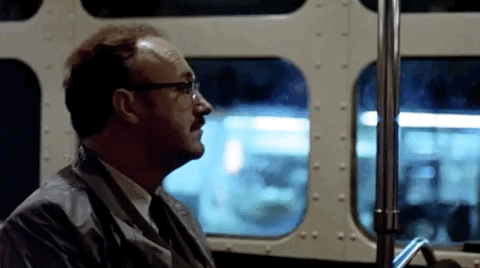
In the scene just before this one Harry has visited a bootycall (Terri Garr). She's tired of his mysteriousness and gives us red flag insights into his personality (we learn through her chatter that he spies on her, too). In one shot, while he's on top of her to kiss her, she barrages him with questions that he won't answer. Her bedroom lamp makes her visible but he's almost swallowed in the darkness of the shot, despite being on top of her; this man refuses to be known.
Cut to Harry on a moving subway. The lights beginning to flicker. Each time when we're getting a good look at him, the light blacks out again. It's another case of obstructed view, of unknowability. We're eager to know what he's thinking since he's just walked out on a woman, he rarely speaks, and the plot of the movie is a mystery even to him. As the light stays out, we dissolve to an image of his surveillance targets that we've seen earlier and then back to him in the dark before the train begins to move again.
Maybe he remains unknowable because there's nothing at all to know? He continually replays the image and sounds in his head, piecing them together, refining them. He's like a film director, cinematographer, sound engineer, and editing team in one, obsessively pouring over his dailies. He is only this work.
And 6 more from the Best Shot club around the web...
Keisha at Cinema Cities... [ARTICLE]
Ryan on Twitter... [THREAD]
from Working Stiff's tumblr... [CAPSULE]
from Ben Miller at Ice Cream for Freaks... [ARTICLE]
AND Alexander Georgakis on Twitter... [THREAD]
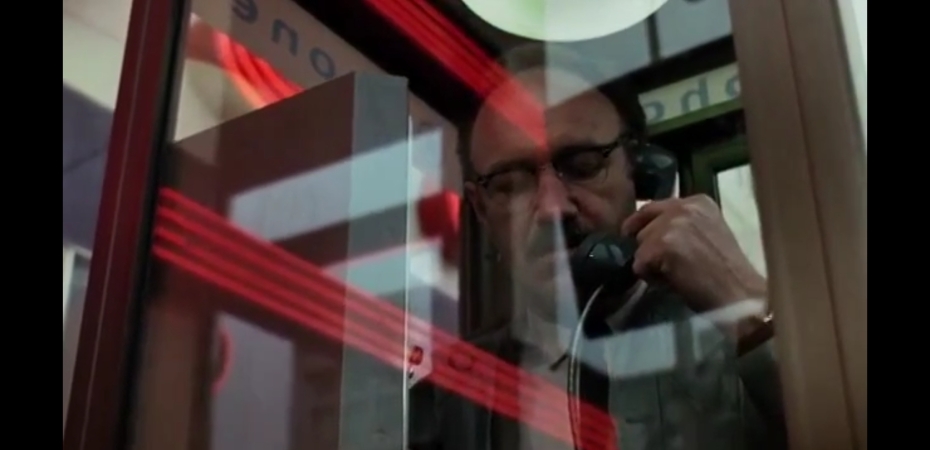
and Cláudio Alves from here at TFE
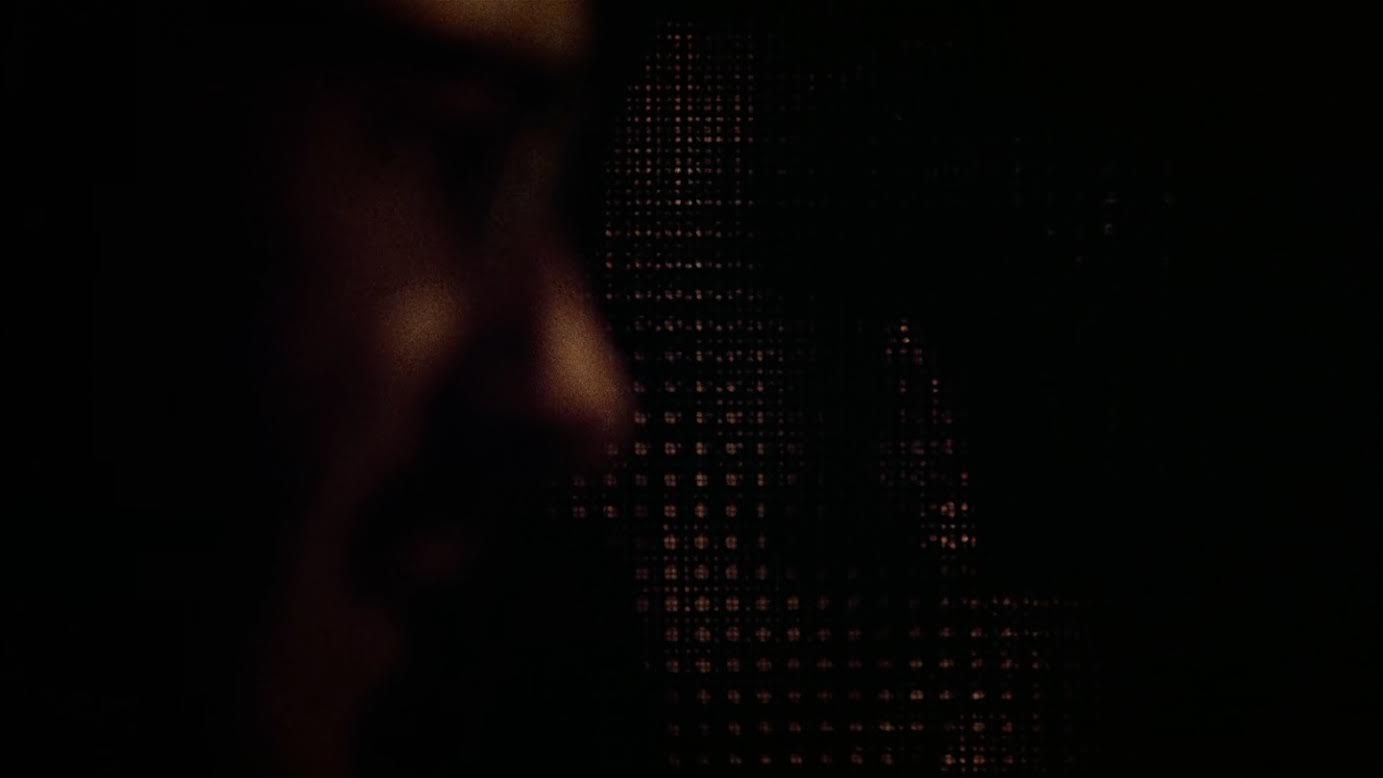
Francis Ford Coppola's best Picture of 1974, the best picture he ever directed, is a monument of precise formalism and a synthetization of a particular brand of 70s thrillers.
Suppose you had asked me about the film's central theme before this re-watch. In that case, I'd have pointed towards the asphyxiating paranoia that runs through that decade's most suspenseful exercises in moviemaking. Hell, the first shot of The Conversation might be the best cinematic translation of that mood of existential unrest, unbearable suspicion in a thriller context. As the camera pushes in on a crowd seen from above, we go from an urban mural observed with serenity to a predatorial gaze that singles out a nondescript man down below. That was my first idea for a best shot, a summation of the film's obsession with perspective and perceived realities, a searching look crystallized by the camera.
However, The Conversation also doubles as a character study of that man, our protagonist and master listener – Gene Hackman's Harry Caul.
For years, I have thought of this muffled tour de force as one of American cinema's best portrayals of loneliness. Not a melancholic sort of solitude, but a gnawing corrosive isolation that eats away at one's soul until all that's left is a bloody stub, a deadened thing that still barely registers as alive. For that, the last shot of the picture seems like the best representative, a man playing a sad song into the night, the world a ruin, and him a ghost in his own home. And so, I had two perfect best shot choices, bookends of paranoia and lonesomeness, plus a likely runner-up in the picture of a bloody hand against glass, violence abstracted as a spectral apparition.
Nevertheless, as it often happens with the "Hit Me with your Best Shot" series, returning to a film looking for a single shot to celebrate above all others leads to new facets of the work revealing themselves. For me, this time around, The Conversation became, first and foremost, a dissection and visceral depiction of guilt, specifically Catholic guilt. Caul's journey into the depths of his soul stems from a reckoning with the consequences of his surveillance. It's also about projections of false innocence, how that guilt grows from skewed perceptions and feeds those same illusions. We're all trapped in our own selves, alone and doubtful, looking for truth but also absolution. Caul is like everybody else, a nobody, a miasma of guilt drowning in dread.
My best shot encapsulates this while exemplifying the film's best visual trick – a patient push-in that hones unto a detail to the level of unintelligible fuzziness. It's a dark tableau of confession, a Catholic man telling his woes to an anonymous priest, confiding into the abyss. As the camera zooms, we lose sight of Caul. He becomes a blob of weak flesh, out of focus, while the impression of an ear comes into view on the other side of the conversation. Simple, yet remarkable, cruel too, Coppola reduces (or elevates) his movie to an act of passive listening amidst a world made of deep shadow, a void of nothingness.
NEXT THURSDAY'S FILM IS WEST SIDE STORY (2021)
Steven Spielberg's Oscar nominated musical is streaming on HBOMax and Disney+ so pick a shot before Thursday evening March 10th and we'll link up to your blog, twitter, instagram, tumblr or site.



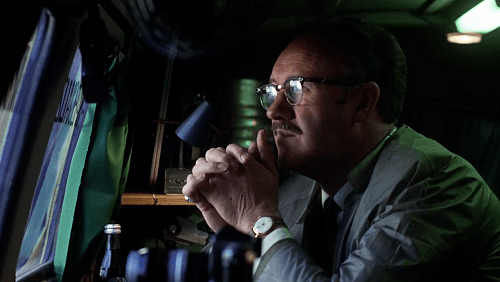
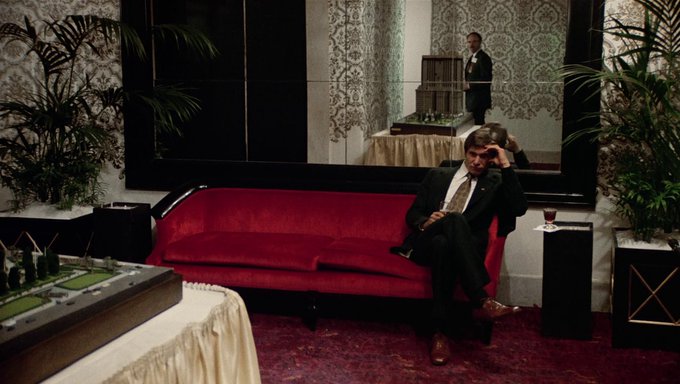
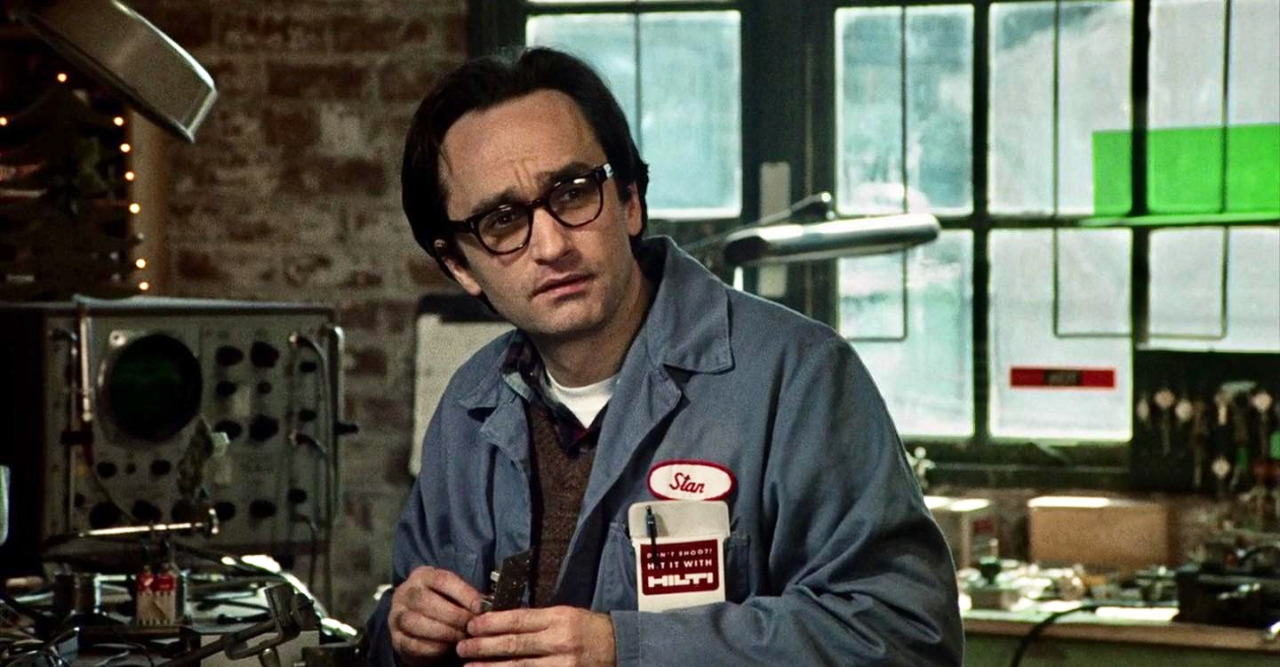
Reader Comments (7)
Hey, where's mine? :(
Sometimes my best shot is actually my "best shot for which I can articulate why it's my best shot." Hence my Harrison Ford-centered shot. Because I very nearly picked the same shot that Claudio picked--in the confessional--but just couldn't say WHY I liked it so much. Then again I am well aware of Catholic guilt so maybe I should have!
It's one of the greatest films ever and I think it's Coppola's 2nd best film behind Apocalypse Now. I love the approach to suspense and the sound work but also Gene Hackman's performance. There is also an often overlooked performance from John Cazale as Stan who works with Hackman's character as he just manages to stand out in every shot he's in.
@ thevoid99
Then you'll like my shot when it's posted. ;-)
Coppola said he made this movie because he wanted to make something like Michelangelo Antonioni's Blow-Up.
That's why it feels not narrative in a traditional sense, less grounded in drama. More abstract.
Claudio picked a great one,this is for me hands down Hackman's best performance shame he was overlooked for Finney in Poirot drag.
I haven't seen this in years, so this was a fun reminder of some things I'd forgotten. I recall loving the end with Hackman sitting forlornly in his torn-up apartment. That might be my best shot.